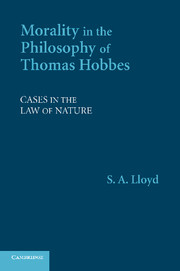2 - Moral Judges: Human Nature and Motivation
Published online by Cambridge University Press: 30 September 2009
Summary
How rare, men with the character to praise a friend's success without a trace of envy, poison to the heart – it deals a double blow. Your own losses weigh you down but then, look at your neighbor's fortune and you weep. Well I know, I understand society, the flattering mirror of the proud.
(Aeschylus, Agamemnon, 818–824)Our task in this chapter is to lay out those essential features of the psychology of Hobbesian agents that we will need to understand for our subsequent investigation of how Hobbes's Laws of Nature are dictates of right reason for such agents, and how men can be motivated to follow those laws and to grant them the sort of normative authority Hobbes assigned them. Hobbes has not infrequently been taken to have ascribed to humankind a simple egoistic psychology according to which men's primary aversion must be to their own violent bodily death, and all of their voluntary actions aimed at avoiding their own death or securing the means for avoiding it (notwithstanding occasional lapses of prudence due to vain-glory).
The persistence of this attribution to Hobbes of a human psychology, conceded on all sides to be too oversimplified to be plausible as an accurate description of actual human psychology, is intriguing. For although Hobbes does sometimes say things that suggest the simple one-note view, the rest of what he says reveals a remarkably rich, complex, and insightful conception of human psychology.
- Type
- Chapter
- Information
- Morality in the Philosophy of Thomas HobbesCases in the Law of Nature, pp. 56 - 94Publisher: Cambridge University PressPrint publication year: 2009



